An impressive 2-1 victory over Uzbekistan saw China book a place in the Asian Cup quarter-finals for the first time since 2004. Second-half goals from the Jiangsu Sainty duo of Wu Xi and Sun Ke allowed China to overcome Odil Ahmedov’s deflected first-half strike and saw Alain Perrin’s side seal top spot in Group B with a game to spare.
ASIAN CUP GROUP B
China 2
Wu Xi 55′, Sun Ke 68′
Uzbekistan 1
Ahmedov 23′
And, while the 1-0 triumph over Saudi Arabia in the opening game of the tournament had a touch of good fortune about it, there was nothing lucky about victory in this highly competitive and entertaining contest. Both sides played a part in a game that has the distinction of being the first match in this Asian Cup to meet the AFC’s target of having the ball in play for at least 60 minutes (62 minutes in total), but China earned the right to leave the Brisbane Stadium with three points.
Wu Xi was rightly awarded the Man of the Match award for his pulsating performance in the middle of the field, and Sun Ke’s fantastic solo effort just two minutes after coming on as a substitute will grab the headlines. But to focus on these two players would be an injustice to a team that, on the whole, performed excellently as a unit.
Perrin made three changes to the line-up that started against the Saudis and, more importantly, adjusted the formation from a 4-2-3-1 to a 5-4-1. This proved to be tactical masterstroke from the Frenchman as, after a difficult time in periods of the first-half, China comfortably handled the Uzbeks’ numerous attacking threats, including their marauding full backs, while still being able to trouble the opponents’ goal.
After a strong opening fifteen minutes from Guozu, the White Wolves fought their way back into the match and were rewarded in the 23rd minute when Ahmedov’s twenty yard shot took a wicked deflection off of a sliding Wu Xi before looping over the helpless Wang Dalei. It was an unfortunate goal to concede but, considering the nature of Yu Hai’s winning goal against the Saudis, China could have little complaint about their opponents scoring in such a manner.
Either side of the goal, both sides had chances to score, but the Uzbeks looked more dangerous overall. Of particular note was right-back Akmal Shorakhmedov who gave Yu Hai and Jiang Zhipeng a torrid time down the Chinese left and almost got his reward in the 18th minute when a deflected shot forced Wang Dalei to push the ball over the bar. A few minutes after the goal, China had their best opportunity of the half when Gao Lin was unable to direct a neat through ball from Jiang Zhipeng on target while at full stretch.
For much of the remainder of the half, both sides were happy to keep possession without taking too many risks, but disaster almost struck for China when Ren Hang pulled back Server Djeparov on the edge of the penalty box in the 35th minute. Thankfully, the referee correctly adjudged that the foul was committed just outside the area, meaning that Ren was spared the distinction of conceding two penalties in two games. The free kick came to nothing and the only other major talking point of the first half came after 41 minutes when Uzbek centre back, Shavkat Mullajanov, intentionally felled Gao Lin around the halfway line. The 28-year-old had already been booked for a similar foul in the 18th minute, but the referee showed mercy by giving him a warning, rather than producing a second yellow.
On the balance of things, the Uzbeks had just about shaded a close first half, but the second 45 minutes was a different story. Both sides made changes at the break with Perrin introducing Hao Junmin on the left-wing for the ineffective Yu Hai, while Mullajanov was wisely withdrawn by Mirjalol Qosimov in order to protect him from the second booking his roughhouse approach was inevitably going to draw.
While Hao wasn’t directly involved in either goal, his lively performance had the positive effect of restraining Shorakhmedov from getting forward and China looked increasingly comfortable as the half progressed. Up until the 55th minute, China’s tactic of overloading wide areas and whipping the ball into the box had failed to bear any fruit, but it was a slightly over-hit cross from Jiang Zhipeng that led to their equaliser. The Guangzhou R&F man’s delivery had drifted over everyone, and seemingly out of harm’s way, but Wu Lei chased it down and was able to direct a weak header back across the box. The ball reached Gao Lin with his back to goal and the Guangzhou Evergrande forward hooked an overhead kick towards an onrushing Wu Xi who showed the kind of composure in finishing that has sometimes been lacking from his game.
Presuming it was intentional, Gao’s assist was highly intelligent and capped an excellent team goal which demonstrated China’s commendable work ethic. The next ten minutes continued to be evenly contested, but a pivotal three minute period proved decisive in deciding the result.
In the 66th minute, the hardworking and constantly fouled Gao Lin was replaced by winger Sun Ke in a move which saw Wu Lei pushed forward into a more advanced role. Just a minute later, Uzbekistan had their best chance of the second half when substitute Shardor Rashidov embarrassed Mei Fang with a slight feint and found himself one on one with Wang Dalei. Despite his penalty save against Saudi Arabia, Wang has had little opportunity to demonstrate his shot stopping ability in this tournament and the Bunyodkor forward’s weak effort straight at the Shandong Luneng goalkeeper did little to change that.
Rashidov should have done more to test Wang and Uzbekistan were made to rue the wasted chance just a minute later when they found themselves behind thanks to the fresh legs of Sun Ke. A straightforward pass from Zheng Zhi found Sun in a pocket of space about 30 yards from goal, and he used the opportunity to drive at the heart of the Uzbek defense. Assisted by Wu Lei who was creating space with a diversionary run, Sun made it to the edge of the penalty area without being closed down and was able to drive a low precise finish passed Ignatiy Nesterov and into the bottom right-hand corner.
Unsurprisingly, the goal was greeted with wild celebrations and, once the Chinese players had calmed down, they had little trouble in holding off an Uzbek team that began fading badly. The Central Asians tried to push forward but could do little to break down a resolute defense while leaving themselves open on the counter. Indeed, China were the only team that looked like scoring in the last 20 minutes.
In the 75th minute, Zhang Linpeng ought to have doubled the lead when he blasted a free 10-yard volley over the bar and, four minutes later, Wu Lei summed up his inconsistent game by giving himself an excellent chance to score by robbing an errant backpass, only to dwell on the ball for too long and watch the opening disappear. In the 85th minute China probably should have been awarded a penalty when a rash challenge from Shorakhmedov sent Wu Lei tumbling over as he looked to take the ball away from goal. Had the Uzbeks found an equaliser, that incident would probably have become a much bigger deal, but that never looked like happening and the final whistle gave China a deserved victory and guaranteed them the rightful status of Group B winners.
Having already made it to the quarter-finals, the Chinese find themselves in the favourable position of knowing that this tournament can be considered a success regardless of what happens in subsequent matches. Making the knockout stages was the limit of most Chinese fans’ expectations and that has been achieved in style. However, it is the nature of this performance, rather than the result itself, which will raise hopes that China can progress even further in the tournament.
The Chinese worked hard to grind out a result in their first game but, over 90 minutes, they outplayed an Uzbekistan team which came into the tournament as the fourth-ranked team in Asia and were considered dark horses to win the whole thing. This was a display which demonstrated China’s confidence in possession as well as their solid organization off the ball and gave a real indication of how far they have come since the 3-1 defeat to Iraq that closed out their faltering qualifying campaign last March.
What’s been particularly impressive over the first two games of the tournament has been China’s abiity to close out games after taking the lead. They have shown great composure in snuffing out two teams with strong attacking arsenals without having to resort to piling eleven men behind the ball.
The quarter-final birth means that Perrin has already earned his money, but he deserves enormous credit for both his tactical flexibility and ability to get the best out of a team of largely unheralded players. China were unbeaten in eight official games going into the tournament, but this win over Uzbekistan marks the culmination of almost a year of hard work and experimentation.
The Frenchman now has a decision to make for the final group game against North Korea regarding the type of team that he fields. With their former Cold War comrades already eliminated from the tournament, there is absolutely nothing at stake in the game. It will be tempting for Perrin to play a second string side and, having seen the North Koreans living up to their reputation of becoming overly physical when things are not going their way in the latter stages of their 4-1 defeat to Saudi Arabia, fear of injury will be of prime concern.
However, there is a risk that fielding a disjointed team will disrupt China’s gathering momentum which can prove all-important in tournament football. Whatever Perrin decides, it’s a relatively minor issue in comparison to that of how to approach a must-win crunch match that many people presumed this would be.
Ultimately, the North Korea game will now be little more than a diversion as attention turns to January 22nd when China will face either South Korea or hosts Australia in the quarter-finals. Regardless of the opposition, China will rightly be considered underdogs for that game but, after this performance, neither the Red Devils nor the Socceroos will be taking China lightly – and that, if nothing else, is a clear sign of progress.
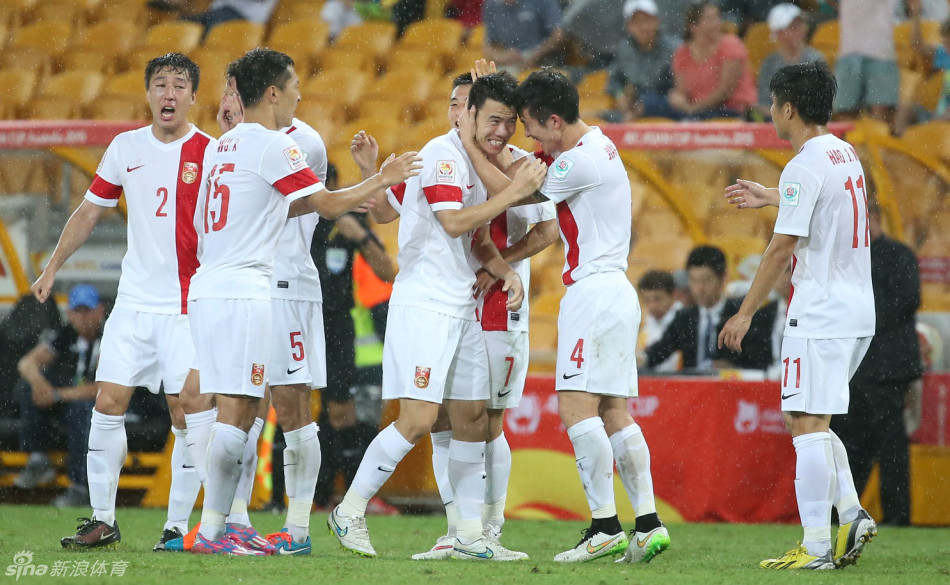
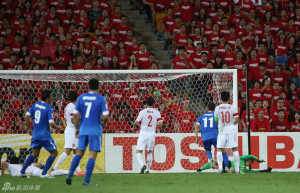
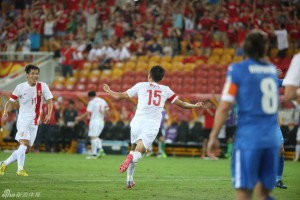
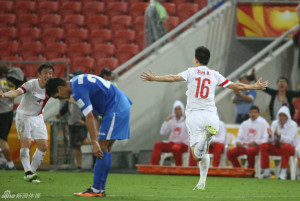
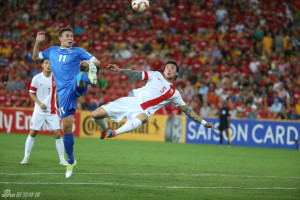
Good write up.
In the first half I thought that with the 3 CB and wing backs plus the mids pushing up, there was a huge hole in the middle that the Uzbeks played through with ease (hence the opening goal with Ahmedov having all the time in the world to line up his shot).
Hao Junmin I thought set up a nice cross field pass to Jiang Zhipeng to set up the first goal and his passing and vision was a key difference to the team’s performance in the 2nd.
Perhaps Perrin will take the Nth Korean game as another tinkering exercise – push Wu Lei up front at the start – see what that does.